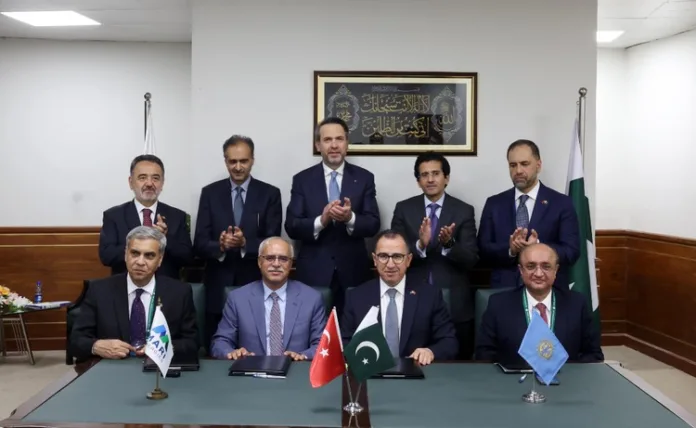✍*Ahmad Syaru Robbani *Yusra Sarwar – Pakistan
Türkiye and Pakistan’s latest energy partnership marks a new move in Islamabad’s Foreign Direct Investment (FDI) chapter. This partnership looks forward to boosting foreign investment, technology transfer, and energy security. While the signing of a Joint Bidding Agreement between the two offers clear opportunities, it also raises questions about whether Pakistan risks swapping one dependency for another.
On July 09, 2025, Turkish Foreign Minister Hakan Fidan visited Islamabad, Pakistan. During the joint press conference with Pakistan’s Deputy Prime Minister and Foreign Minister Muhammad Ishaq Dar, he referred to the agreement signed back in April between Turkish Petroleum Corporation (TPAO) and three Pakistan’s national oil companies, including Oil and Gas Development Company Limited (OGDCL), for exploring offshore oil and gas. Pakistan’s Petroleum Ministry seeks this agreement as a “significant opportunity” to attract Foreign Direct Investment (FDI) in its upstream energy sector. Through this engagement, the federal government aims to reduce its reliance on imported oil, which currently accounts for over 70% of its needs. With domestic production at only 80,000 barrels per day, new exploration is not just an economic policy but also an energy security.
On the contrary, Türkiye’s motivation is equally clear. In light of Western sanctions on Russia, Ankara has dramatically reduced its imports of Russian crude oil, making up just 19% of its imports in March. Moreover, Tupras, Türkiye’s biggest refiner, has limited purchases to G7 price-cap-compliant barrels to avoid U.S. sanctions. In this course of action, partnering with Pakistan offers Ankara a potential “Southern Route” for future energy trade, bypassing risky northern corridors and reinforcing its role as a Eurasian energy hub. For Pakistan as well, this “Southern Corridor” vision might boost its geopolitical significance while attracting much-needed investment and technology. Considering Ankara’s broader regional strategy, it can strengthen political ties with a key Muslim-majority ally in South Asia and gain strategic access to the Arabian Sea, Gwadar Port, and potential connections to the Gulf and Africa.
However, these opportunities also come with serious risks of dependency that Islamabad must manage carefully. Pakistan has often struggled to convert foreign-led projects into sustainable, locally beneficial ventures. Examples like exploration with ExxonMobil underscore the technical challenges. In this regard, Pakistan must avoid this mistake when dealing with Türkiye. It should avoid creating an asymmetrical dependency on Türkiye. To prevent this, Islamabad will need strong contract terms that guarantee training, local employment, and fair revenue-sharing.
The situation is further complicated for Pakistan as it has to create a balance with other foreign partners, particularly China and the Gulf Cooperation Council (GCC) states. China remains deeply invested in Pakistan’s energy and infrastructure through the China-Pakistan Economic Corridor (CPEC). It is upgrading Pakistan’s rail network, developing Gwadar Port, and, according to Xinhua, Chinese firms are also able to invest in Pakistan’s offshore energy sector. Far from replacing China, Turkey’s entry will add another layer of competition—and potential overlap—to Pakistan’s foreign partnerships.
Pakistan’s relationship with the GCC is also critical. It depends on Saudi Arabia and the UAE for oil imports, concessional financing, and remittance income from millions of Pakistani workers. Saudi Arabia has also pledged billions for a refinery project at Gwadar (though progress remains slow). Any perception that Islamabad is shifting allegiance toward Ankara at the expense of its Gulf partners could complicate these lifelines.
Finally, the pact must be seen in the broader context of critical minerals and strategic competition. As the world races to secure energy transition materials, Pakistan’s unexplored offshore and onshore potential could become a new arena of geopolitical rivalry. China already controls much of the world’s rare earth supply and has secured exclusive mining deals in Africa. Turkiye’s move into Pakistan may be partly aimed at breaking this monopoly, but Islamabad must ensure it is not simply trading one dependency for another.
To truly make this energy pact an opportunity rather than a dependency, Pakistan needs a clear, sovereign strategy. That means transparent bidding, fair deals, strong local benefit clauses, and a balanced diplomatic approach that maintains ties with Türkiye, China, and the GCC with strategic interests. Only then can Islamabad turn foreign interest in its energy resources into real, lasting development for its people.
